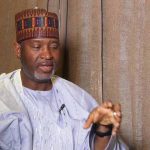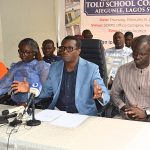...To get all news updates, Join our WhatsApp Group (Click Here)
Also Join our WhatsApp Channel (Click Here)
The Economic and Financial Crimes Commission, EFCC, on Friday, February 2, 2024, presented its first prosecution witness, PW1, Chibueze Chukwuma, Team Lead, Regulatory Enquiries Unit, Access Bank, against a couple, Ruth Idowu and Oriyomi Idowu, who are being prosecuted for an alleged N2.7bn fraud before Justice Mojisola Dada of the Special Offences Court sitting in Ikeja, Lagos.
The defendants are facing 20-count charges bordering on obtaining money by false pretence, money laundering, stealing, retention of stolen property and forgery to the tune of N2,757,188,000.00 (Two Billion, Seven Hundred and Fifty Seven Million, One Hundred and Eighty-eight Thousand Naira Only).
They were arraigned on Tuesday, November 28, 2023 by the Lagos Zonal Command of the EFCC alongside Food Commodity Processing Enterprise, Bonway Food Processing Company Limited, Samee Idowu Company Limited and Farmex Integrated Companies Limited, which all belong to Ruth Idowu.
Count one reads: “Ruth Sameeha Idowu, a.k.a. Loiry Ventures, Oriyomi Kabeer Idowu, a.k.a. Yocli Ventures, Food Commodity Processing Enterprise, Bonway Food Processing Company Ltd., Samee Idowu Company Limited, Farmex Integrated Companies Limited, between 31st of March 2022 and 17th of May 2023 in Lagos, within the jurisdiction of this Honourable Court, conspired amongst yourselves by a false pretence that you had a genuine Local Purchase Order (LPO) from various vendors and with intent to defraud, obtained from Creditpro Business Support Services Ltd the sum of N2,757,188,000.00 ((Two Billion, Seven Hundred and Fifty Seven Million, One Hundred and Eighty-eight Thousand Naira Only).”
Another count reads: “Ruth Sameeha Idowu, a.k.a. Loiry Ventures, Oriyomi Kabeer Idowu, a.k.a. Yocli Ventures, Food Commodity Processing Enterprise, Bonway Food Processing Company Ltd, Samee Idowu Company Limited, Farmex Integrated Companies Limited, sometime in 2023 in Lagos, within the jurisdiction of this Honourable court, converted the sum of N10,000,000 to purchase a GLK Benz, purchase sum derived from converting the sum of N500,000,000 belonging to Creditpro Business Support Services with the aim of disguising the illegal origin of the funds.”
At Friday’s proceedings, Chukwuma narrated how the EFCC, in the course of investigating the defendants, had written to the bank to furnish it with some documents.
Led in evidence by prosecution counsel, A.O.Muhammed, the PW1 said his Unit was in charge of dealing with requests from law enforcement agencies and responding to them accordingly.
“I know Loiry Ventures, Yocli Ventures. They are our customers. We got a letter of inquiry from the EFCC, requesting their account opening packages and statements of account; and we responded accordingly,” he said. He, thereafter, identified the letter of inquiry which the EFCC sent to the bank with regard to the investigations.
He also identified the response of the bank, which included the account opening packages and their bank account statements. Thereafter, Muhammed applied to tender them in evidence against the defendants.
There was no objection from James Alara, counsel for the first, third, fourth, fifth and sixth defendants; and Babatunde Ogala, SAN, counsel for the second defendant.
Justice Dada admitted the bundle of documents in evidence as Exhibit P.
Testifying further, he identified the first defendant as the signatory to Food Commodity Processing Enterprise. “For Yocli Ventures, the signatory is Oriyomi Kabeer Idowu(second defendant); and for Loiry Ventures, he is also the sole signatory,” he said.
He was, thereafter, taken through the bank statements of Food Commodity Processing Enterprise as he highlighted several inflows from Creditpro Business Support Services, which were subsequently transferred to the companies where the defendants were signatories.
Under cross-examination by Ogala and Alara, he maintained that the defendants were signatories to the accounts, where the money was transferred to at various times.
After the testimonies of PW1, Justice Dada adjourned the matter till March 20, 21 and 22, 2024 for continuation of trial.
You can get every of our news as soon as they drop on WhatsApp ...To get all news updates, Join our WhatsApp Group (Click Here)
Also Join our WhatsApp Channel (Click Here)

















